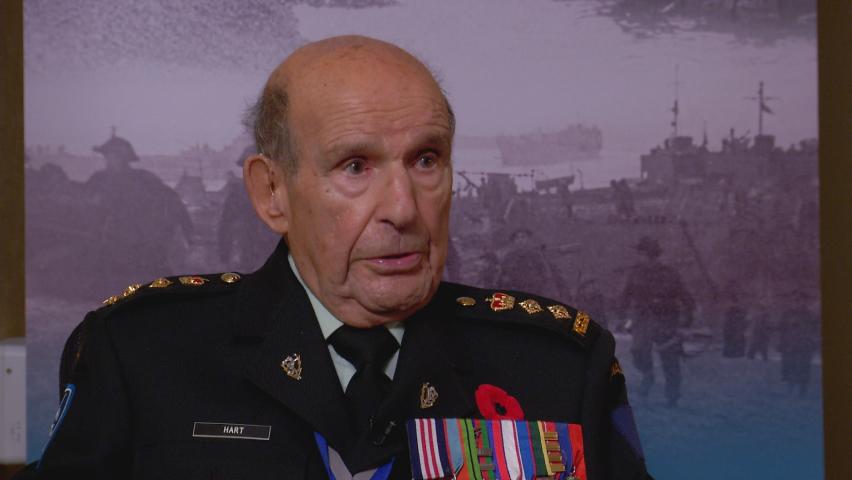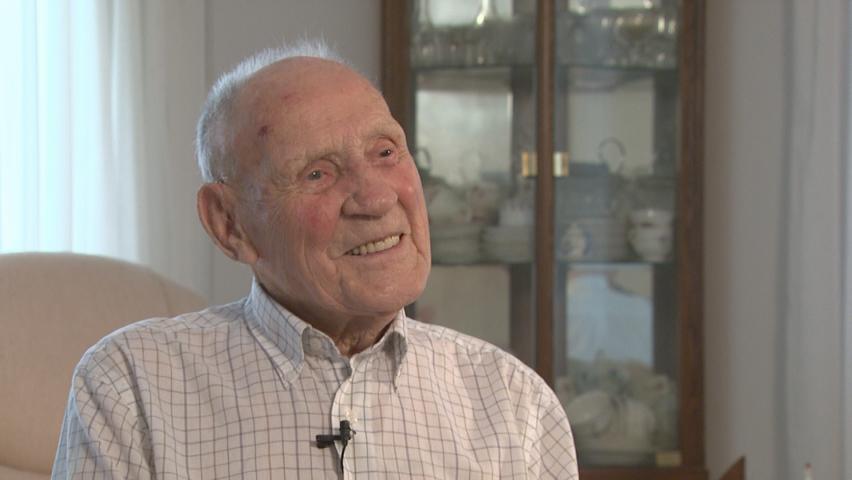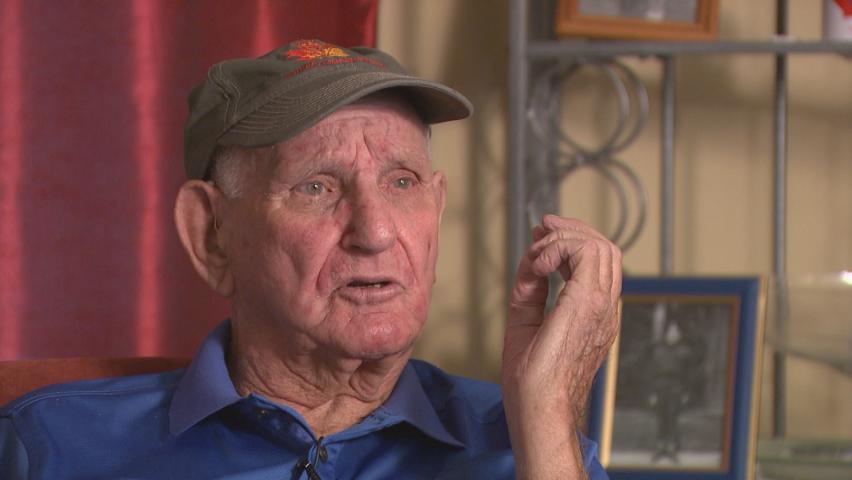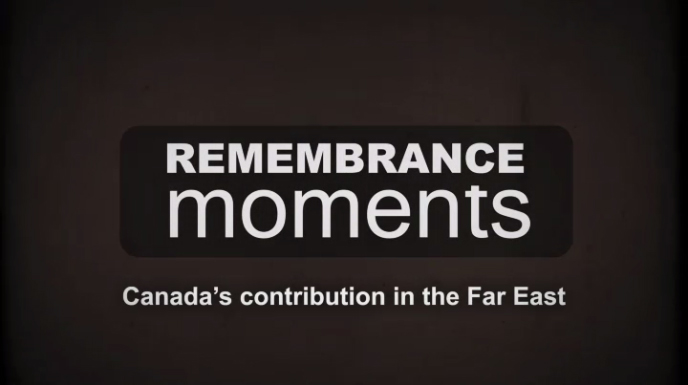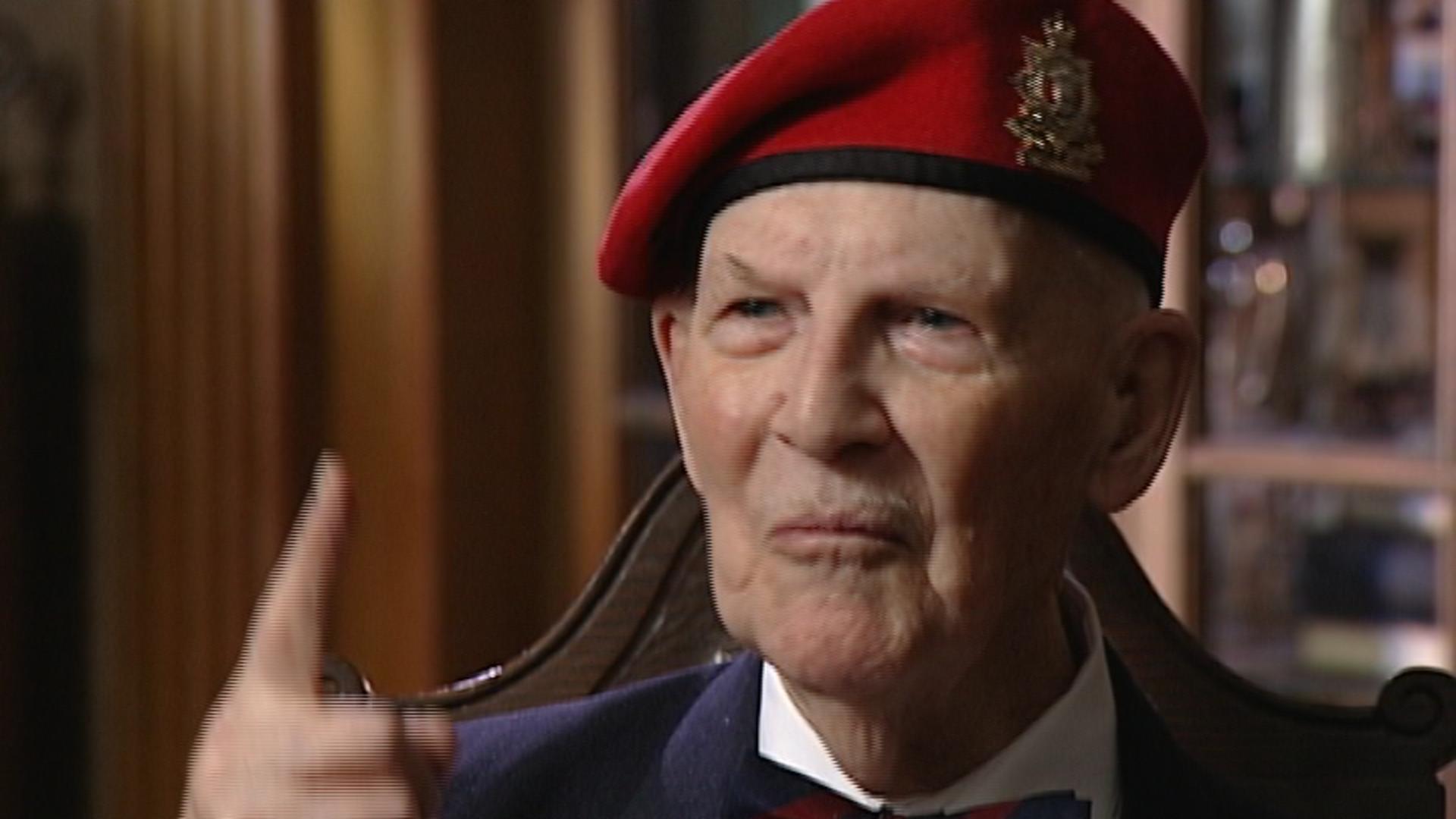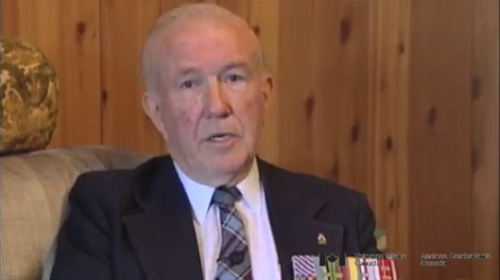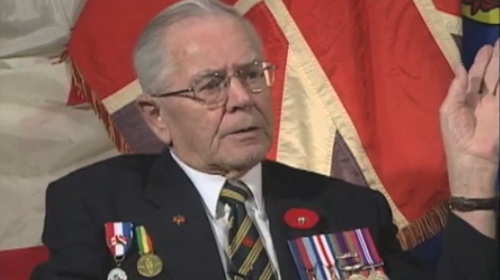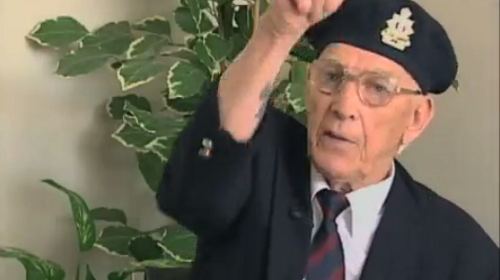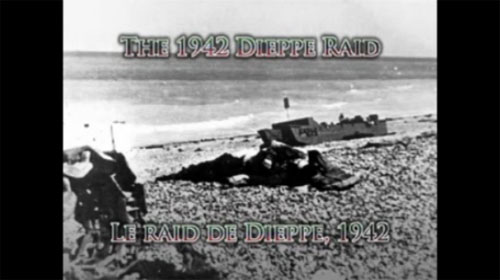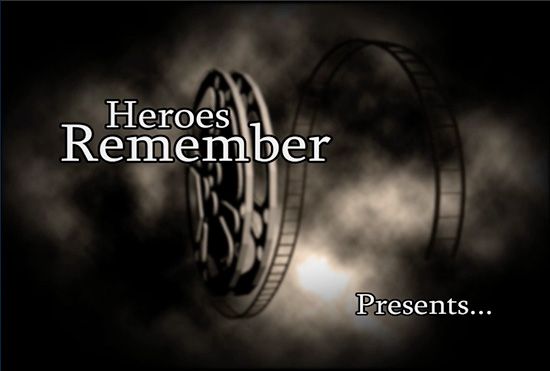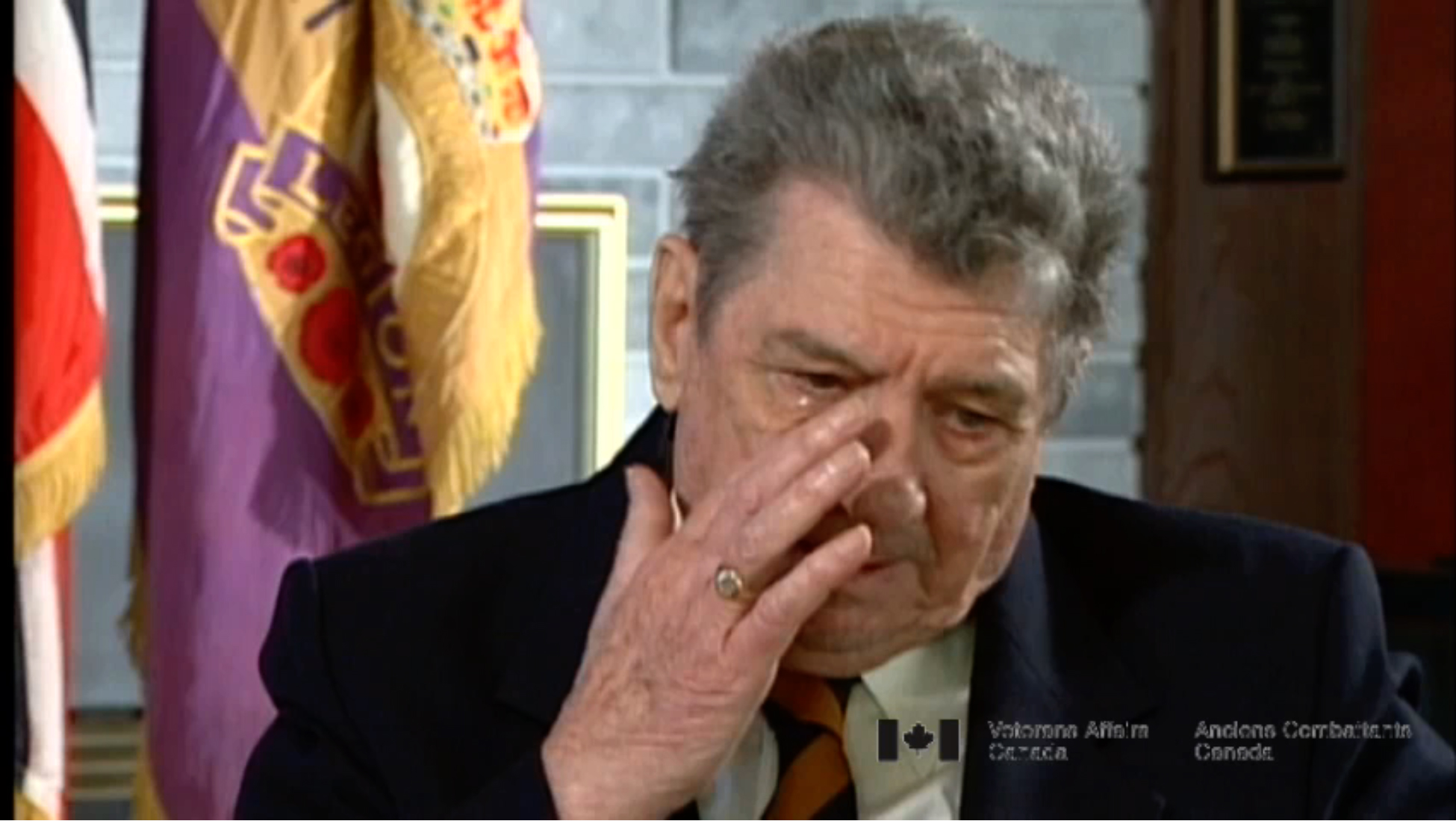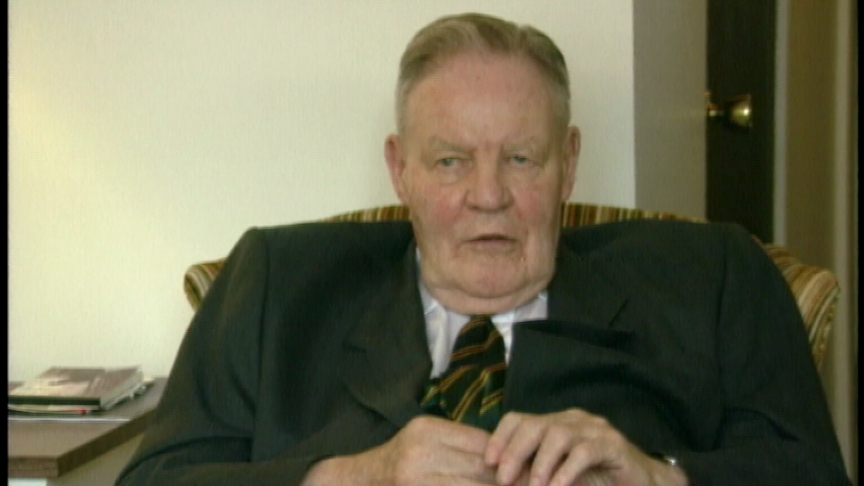Heroes Remember Presents D-day
Heroes Remembers Presents
Heroes Remember Presents D-day
Transcript
Geoff Corry : When you’re 19, or 20, or 21 you know
that, you believe that you’re invincible.
Albert Clevette : We had been warned quite extensively that
we would suffer some pretty horrendous casualties.
Raymond Tanner : When we got ready for D-Day, we were given photographs
of where we would land and where we had to, as soon as we landed, which way to go.
Robert Graham : And we were issued French francs. We were,
our pay books were taken away from us. We were just left with our
identification discs, which of course in those days there was
three of them. One, one was fire proof, the other was for the
Graves Commission, and the other one was if you were shot and
killed or blown up, your buddies would take off your tag and
leave one in your mouth so that the Graves Commission would come
along and know who you were.
John Hall : We were getting on ship and I was here and he was away down farther,
but I saw him and I waved at him and he waved back and he said, “Good bye John,”
and he’s the first guy I saw dead on the beach.
Charles Fox : The Channel was solid with ships.
So you could almost walk across on it.
Ivan Doherty : It was marked out where the landing
ships were supposed to go you see, and the other battle ships,
it was marked out for them to drop anchor and use their big
guns, so everything was pretty well pre-planned.
Earl Gray : The minesweeper had to go first and clear all the mines
so the other landing craft, the assault boats and the ships that were coming
in would be able to go into the beachhead without getting in too much trouble.
Dennis Goodwin : The people just cleaning their
rifles, sharpening up their bayonets and their knives making
sure everything was in working order and your equipment was all good.
Robert Graham : We were landlubbers and everybody was sick
on that LCI. The LCI is a small, a small boat.
Fred Rogers : The barges were just buckling, bending, creaking, groaning
and everything was soaking wet, water coming up over the side, oh what a mess.
Albert Clevette : And we then got to the point you didn’t give a damn where you were,
you just wanted to get on shore, get off this thing.
James Edwards : You could see them looking down that
they were dropping their gliders right in the, across the enemy lines
and of course, they were just mowing them down.
Norman Wright : D-Day we landed right in the middle of the enemy.
When I was coming down the chute, I could hear the guns going off.
Harold Hague : They weren’t interested in us as much as they were
the ships that were behind us, the big ones, that’s what they wanted.
James O’Neil : Then the first darn thing, “Wham!”
I looked and here the ship broke right in two and
the whole stern end of it right straight up.
Dennis Goodwin : From the big landing ships, you go into a small
harbour ship, the landing craft, the small ones go down
the rope, the ladder down the side of the ship.
Peter Buote : It’s kind of a rough deal. One man got crushed
right between the, between the ship and the landing craft
as we were trying to get in.
John Hall : Practically all our boats got blown up or had to
go back because of so much mines. But I remember on our boat
that one of the guys got right up on the front of it and put his
foot on one of those mines and pushed us back, or else we would
have been blown up too.
Albert Clevette : And then we got hit on the ramp and
it welded the ramp shut on one corner, on one side,
but the tank was the first vehicle to go off and he hit the ramp,
they loosened the cables and he hit the ramp and broke it
free and it just dropped down and away we went off.
Fred Rogers: I watched the first SP go off, and I waited to see if the
front end would raise up. It did and it floated ashore, and
everyone of our, on our barge got ashore fine.
George McLean: Landing craft beside us got a direct hit and, of course,
they lost a lot of their troops right there. She was burned just like to a shell.
Hough Nordlund : If you didn’t get off you’d push them off.
I didn’t have to do it, there was fellows up front
that had to or their own people had to. It was kind of sad.
And a lot of them never made it to the beach.
Peter Buote : Some of the water was too deep, the guys just went under.
They couldn’t come up, not with 65 pounds of weight and some of them
more than that, especially a man carrying a Bren gun and all his
ammunition and everything, probably carrying well over 100 pounds.
Tom Settee : We jumped into the water. It was up to here
for goodness sake, almost up to our shoulders, you know, and you
had to wade. You had a Bren gun or a rifle. You had to hold it
and wave it, you know.
Earl Gouchie : But that boat went up on that sand, just glided up there just like nothing,
never jarred and I got one foot wet going to shore. But the first thing I saw
was a body floating in and out there on the waves out there on
the edge of the shore, the beach there. :
Earl Gray: They were brave men. If there’s any such a thing as a hero on D-Day,
it was the first assault troops that went ashore.
Paul Ducharme : My tank on my right was right next to me with,
both together. He hit a mine on his right boogy.
Donald McKnight: But as soon as they found out that we were on the beach,
they started shelling us, so we moved pretty fast.
Keith Brown: Well, one mortar bomb hit the first gun of Able troop.
Of course, loaded with ammunition, right way, “Swooosh.”
Robert Graham : So these flail tanks finally got in. You got those
flails going and they were blowing mines up by the thousands all
over the beach and that was clearing, clearing room for us to get in.
Earl Gray : The Germans had a big barricade up there.
They had a bulkhead and they had a machine gun and they had a
bunker, and as soon as they come off the beach, they could pick
them off and slaughter them.
Leo Dionne : Then when we turned to go in I was near
Richard [Carien], my friend. He got killed there.
John Hall : But there was wounded everywhere and
screaming and hollering. People in the water floating and oh, everything.
Harold Hague : When you’re dying, when these guys
were dying that’s what they said, you know, “Mama, Mama.”
Fred Rogers : Our job was to walk ahead of the convoy and move any
dead bodies we might run over. That was my first view of war.
John Toney : You depend on each other and if that dependency
wasn’t there you’d be hopelessly lost right from the start.
Joseph Ross : The Lance Corporal of our brad group, he stopped me.
I was in a path, right in front of me was a mine... He saved me.
Peter Buote : After we got so far in past
these positions that were knocked out, we were told to dig in
and then another company come behind and pass through us and they carried on the battle.
Albert Clevette : We just went as fast as we could up the road and got to the bridge,
found the place, the little village and took it and we got into a fire fight.
Earl Gouchie : But then when we finally got in, got on the tanks,
we just... A lot of places we just by-passed, we didn’t stop for nothing.
A couple of times we’d come under heavy artillery fire.
Leo Dionne : We heard the bombs, we heard the
“whizzzz”, the bullets and the shotgun and that goes, “peep, peep.”
You never know, nobody knows when you’re going to be hit
because the one that’s going to get you, you won’t hear it.
Donald Thompson : I was going up the road and this chap waved
and I thought, “That’s friendly, isn’t it,” and I waved back,
and he wasn’t really being friendly. He was telling me, “Stop, stop,”
because just a little ways up the road is where the Jerries were, you see.
Raymond Tanner : She had a handful of roses,
she threw it at the tank and one fell in the turret.
I picked it up and I put it on the gun mount and it was there when we lost it.
Fred Rogers : We moved up from there up to the south
side of Banville to set our guns up and we were there, that’s
the farthest point inland that anybody got that night, I think it was seven miles in.
Georgina Seeley : We had not one patient.
Twelve hundred empty beds with hot water bottles in them.
After I spoke with this man I looked out the window. You could not see
the end of the ambulances. Every bed was filled, twelve hundred beds.
Isn’t that something!
Harold Hague : You know, it’s a terrible thing to hold someone in your arms,
you know, when he’s dying.
Leo Dionne : You can never go to bed at night before thinking
of the guys who died. They’re the ones that saved my life.
They’re the ones that won the war. Not me, it’s them.
They lived their life for their country, as simple as that.
Description
Recollection of Veterans of D-Day.
Meta Data
- Medium:
- Video
- Owner:
- Veterans Affairs Canada
- Recorded:
- April 10, 2019
- Duration:
- 11:22
- War, Conflict or Mission:
- Second World War
- Location/Theatre:
- France
- Battle/Campaign:
- D-Day
Related Videos
- Date modified:



